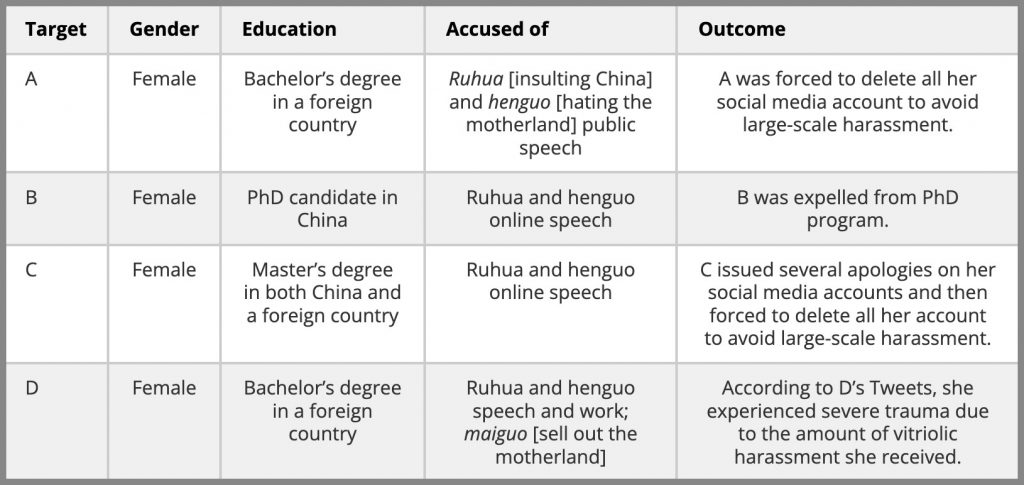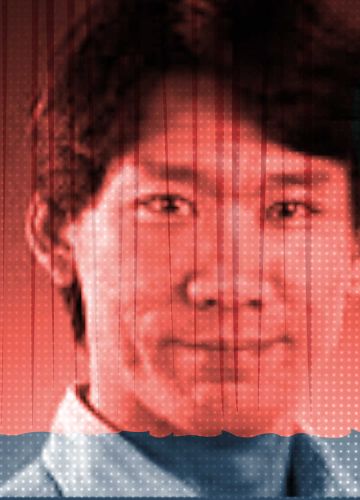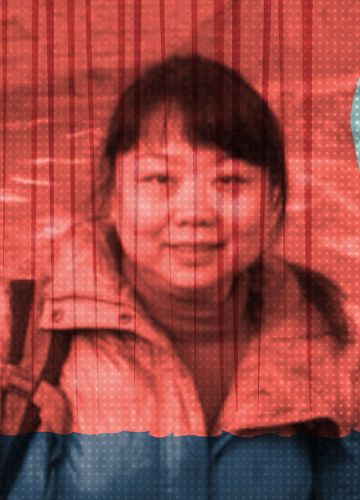Digital Vigilantism and the “Good Chinese”

Ryan Ho Kilpatrick

Qian Huang
Ryan Ho Kilpatrick: The easiest targets for digital vigilantes are typically foreign individuals, countries, and brands. So when they turn their sights on other members of the same national or ethnic communities, how do they turn people who should be “one of us” into Others?
Qian Huang: In theory, there are a set of values and social norms shared in Chinese society to determine whether a fellow Chinese citizen is “a good Chinese.” These norms are normally very general and therefore porous, such as “love your motherland” and “make contributions to the country.” These virtue words are open to interpretation in different cases, by different people and communities. Instead of defining what patriotic behaviors are, it is more common to define what is unpatriotic; and this list has grown longer in recent years.
There are no stable and agreed-upon standards, which means any behaviors and speech can be interpreted as unpatriotic if needed.
For example, Celebrities can be denounced as unpatriotic if they don’t post “I love China” on National Day or “never forget national humiliation” on the anniversary of the Nanjing Massacre. Of course, the party-state plays a very important role in shaping these values as well. Unpatriotic behaviors can also be trivial and linked to current affairs. Being a fan of K-pop groups was regarded as unpatriotic during the THAAD controversy and criticizing China’s zero-covid policies was also regarded as a betrayal during the pandemic. This is the most horrifying part of this phenomenon. There are no stable and agreed-upon standards, which means any behaviors and speech can be interpreted as unpatriotic if needed.
RHK: Why are these attacks so often gendered? What is it about nationalism and misogyny that so seamlessly dovetails?
QH: Women are often regarded as the property and vessels of the nation because their reproductive function is needed to “continue the national bloodline/lineage” in our patriarchal society. Therefore, women’s sexual morals have always been heavily policed, especially by “patriotic men.” Nowadays, because of globalization and international mobility, the sexual moral purity of “our women” is seen as at risk since many of them choose to romantically engage with foreign men. Also, our society has always held higher moral standards for women than other social identities such as mother, daughter, and wife. Therefore, women need to fulfill many more standards to be regarded as qualified “patriotic women.” They are not only evaluated against the already fluid and porous norms of a patriotic citizen but also against the moral standards for “a good Chinese woman.”
RHK: In your research, you point to three main nationalist discourses: the “ungrateful traitor,” the “corrupt elite,” and the “ugly slut.” Time and again, we’ve seen how well-educated, ethnically Chinese women who were educated or work abroad are targeted with particular vitriol — do you think this is because they represent the intersection of these three discourses?
QH: Yes, but in a dialectic manner. On one hand, this is exactly how intersectionality creates amplified vulnerabilities for a certain group of people. Because of their various social identities and characteristics, they are hit by the perfect storm of these three discourses and become victims. On the other hand, these discourses emerge when they become the targets because the patriotic vigilantes need all the justifications to shame and exclude them.
RHK: In the case studies you looked at, what was the personal toll for those targeted in such campaigns in terms of their careers, personal relationships, safety, and emotional well-being?
QH: I didn’t get in touch with these targets because I was afraid that I might cause another round of trauma by asking them to discuss their experience, especially when I don’t have the expertise in therapy. Therefore, I don’t have first-hand knowledge about these tolls. However, based on my observation of these cases’ development, all of them will have a very hard time finding a desired job in China; none of them use publicly visible social media accounts anymore; one of them was expelled from her study at a Chinese university; and one of them is still active on Twitter, where she openly shares that she has been under constant fear that someone is following her because of the amount of harassing messages and calls she gets.

RHK: Who among state media, commercial media, and internet users is most responsible for propelling these attacks? Do you see more often see them emerging organically from the bottom up or being orchestrated from the top down?
QH: The vitriol from internet users is the most vicious and uncensored. However, commercial media are most responsible for propelling and amplifying these attacks because of their reach and framing function. State media is mainly responsible for the “ungrateful traitor” discourse, but stays away from the other two.
Attacks come mainly from internet users and commercial media in a bottom-up manner but [are] later condoned and further propagated from the top down… based on the fact these discourses still exist online, we can say that the top does not oppose them.
I think it is a mutual shaping procedure. In the beginning, the attacks come mainly from internet users and commercial media in a bottom-up manner but were later condoned and further propagated from the top down. However, I don’t have any concrete evidence that this is the case, but we all know that if the party-state wants to censor a certain type of public opinion or discourse, it will be done. Therefore, based on the fact that these discourses still exist online, we can say that the top does not oppose them.
RHK: You’ve written that state-run media avoid directly engaging in misogynistic discourse and populist skepticism, but do you think this is changing? While recent pieces like this China Daily video on female Chinese journalists working for international media do not necessarily throw around gendered insults, they seem to be informed by the same discourse nonetheless.

QH: Yes, definitely. The state media still wants to present themselves as rational and professional, and that image will be undermined if they blatantly engage with misogynist and populist vitriol. However, highlighting individual female journalists or scholars and linking feminist movements (and other social movements related to marginalized groups) to intervention by “foreign forces” have become their go-to strategies.
RHK: Misogynistic, nationalistic abuse from digital vigilantes is a worldwide phenomenon, and harassment of women in the media is commonplace globally. But what is it about the situation in China that you believe is unique or notable? When you write about patriotism being a universal good that precedes other values, for instance, is that is something particular to — or particularly strong in — the PRC’s current political climate?
QH: First of all, I think you are right to say that this is a global phenomenon, and I see more similarities than differences in how these discourses form among populist nationalist groups in different countries. However, these discourses and sentiments are more mainstream in China, exactly because of the current political climate where nationalism and anti-west sentiments are not only condoned but also promoted by the state.
RHK: Do you see any way out of this cycle whereby, as you put it, “gendered identity gets shaped through a nationalist discourse which, in turn, (re)produces a nationalist identity”? Due to their intersectional nature, is it imperative that misogyny and nationalism be addressed in tandem?
QH: I’m an optimistic pessimist. I think that it is very hard for us to change the current power structure and dominant ideologies, but I still want to believe that we can bring some changes.
It is imperative to address misogyny and nationalism together because nationalism is always patriarchal.
I completely agree with you that it is imperative to address misogyny and nationalism together because nationalism is always patriarchal. To do that, we should promote individual narratives instead of grand narratives; we should complicate the discourses on social media platforms with various types of storytelling, bringing nuances back to public discussions. However, the fundamental solution should still come from the structure level, for which I don’t have a solution and I’m rather pessimistic about it. I hope I can get closer to that answer in my future research.

Ryan Ho Kilpatrick






